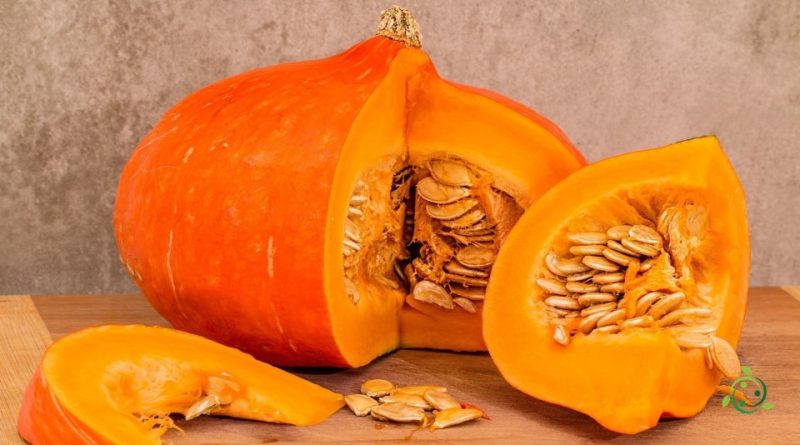Nutritional value of Pumpkin
Nutritional value of Pumpkin
Pumpkin (Cucurbita maxima Duchesne, 1786) is an annual herbaceous plant of the Cucurbitaceae family, widely cultivated worldwide for its food properties.
Characteristics –
Pumpkin is a plant that is grown worldwide for its edible fruit and seeds.
Pumpkin is an annual plant that grows in the form of a vine, with creeping or climbing stems that spread over the ground. It can reach considerable dimensions, with large and lobed leaves, dark green in color and serrated edges.
It produces unisexual flowers, i.e. separate male and female flowers. Male flowers are usually more numerous and appear first on the plant, followed by female flowers.
The squash fruit is a large, rounded pumpkin with a hard, thick skin. Its coloring varies according to the variety and can be of different shades of green, orange or yellow. Some varieties can reach exceptional dimensions and even weigh hundreds of kilos.
Giant pumpkins contain numerous flat, white seeds, which are also edible and often used in cooking.
Giant pumpkins are mainly used as food. The pulp of the pumpkin is sweet and dense, perfect for preparing soups, purées, cakes and desserts. Winter squash gets its name from this species of cucurbit, as its tough skin allows it to be stored for long periods during the winter.
Given their impressive size, giant pumpkins are often used for decorative purposes at festivals, fairs and competitions.
Pumpkin seeds are also a source of nutrients and can be eaten raw or roasted.
Nutritional card –
Pumpkin is widely used as a food in various cuisines of the world and is appreciated both for its flavor and for its nutritional properties. Below is an approximate nutrition card for 100 grams of raw pumpkin:
– Calories: 26 kcal
– Carbohydrates: 6.5 g
– Proteins: 1 g
– Fat: 0.1 g
– Dietary fibers: 0.5 g
– Sugars: 2.8 g
– Sodium: 1mg
– Potassium: 280 mg
– Vitamin A: 1,122 IU
– Vitamin C: 9 mg
– Calcium: 21 mg
– Iron: 0.8 mg
– Magnesium: 12mg
Pumpkin is an excellent source of vitamin A, which is important for vision, immune system and skin health. In addition, it contains vitamin C, which acts as an antioxidant and helps strengthen the immune system. Pumpkin is also a source of potassium, a mineral essential for the proper functioning of the heart, muscles and nerves.
In addition to these substances, pumpkin also contains a variety of beneficial phytochemical compounds, such as carotenoids (such as beta-carotene), which give the characteristic orange color and are powerful antioxidants. Other nutrients, such as flavonoids and polyphenolic compounds, may contribute to pumpkin’s beneficial health effects.
Note that the nutritional values may vary slightly depending on the pumpkin variety and degree of ripeness. Also, the nutritional values above refer to raw squash. When squash is cooked, the nutritional values may vary depending on the cooking method used. For example, steamed squash will have a different texture than fried or roasted squash.
Pumpkin is a versatile food that can be used in many ways, from soups and purees to desserts and side dishes. Incorporating pumpkin into your diet can provide a variety of health-promoting nutrients.
Property –
Pumpkin is known for its nutritional and healthy properties. Here are some of the properties associated with this plant:
1. Nutrition: Pumpkin is full of essential nutrients. It is a good source of vitamin A, vitamin C, vitamin E, potassium, magnesium and dietary fiber. These nutrients are important for overall well-being and proper functioning of the body.
2. Antioxidants: Winter squashes contain antioxidants like beta-carotene and lutein, which help neutralize free radicals and protect cells from oxidative stress.
3. Immune Support: Thanks to the presence of vitamin C and other nutrients, pumpkin can help strengthen the immune system and protect the body from infections and diseases.
4. Vision Benefits: The beta-carotene found in winter squashes is converted into vitamin A in the body, which is essential for eye health and good vision.
5. Anti-Inflammatory Properties: Some studies suggest that winter squash extracts may have anti-inflammatory properties and may be beneficial in reducing inflammation in several conditions.
6. Satiety and Weight Loss: Winter squashes are relatively low in calories and high in fiber, which can help promote satiety and support weight loss in a balanced diet.
7. Heart Health: The potassium in pumpkin can help keep blood pressure in check and support heart health.
8. Skin Benefits: Some people use winter squash extracts for skin care, as they are believed to have moisturizing and soothing effects.
It’s important to note that while squash offers several health benefits, it’s always best to include it in a balanced and varied diet to maximize its positive effects. Also, if you have any particular health conditions or concerns about taking new foods, it is advisable to consult a health professional or dietician.

